These docs are for Cribl Stream 4.3 and are no longer actively maintained.
See the latest version (4.16).
Lookups and Regex Magic
Regular expressions are not just for field extractions - they can also be used inside lookup tables, and in Functions, to replace and manipulate values within fields. Let’s walk through a Pipeline that demonstrates four different ways to leverage regular expressions in Cribl Stream.
Why Lookup Tables Matter
When organizations use host naming standards, it is easy to understand things like regions, availability zones (AZs), IP addresses, and more. For example, consider an Amazon host called:
ec2-35-162-133-145.us-west1-a.compute.amazonaws.com
This is an EC2 host with a (dashed) IP address 35-162-133-145, in the us-west1 region, in Availability Zone a. You can also see the domain: compute.amazonaws.com.
While we can understand the enriched host names, we don’t know which indexes to route the data to, nor which sourcetypes to assign to the events, without looking up this information from another source. Doing so is often a huge challenge for organizations. To solve this challenge, let’s combine Regex Extract, Lookup, and Eval Functions with some sample events to demonstrate the power of Cribl Stream.
Sample Events
The events below have timestamps broken out, but no indexes, sourcetypes, or other details have been assigned yet:
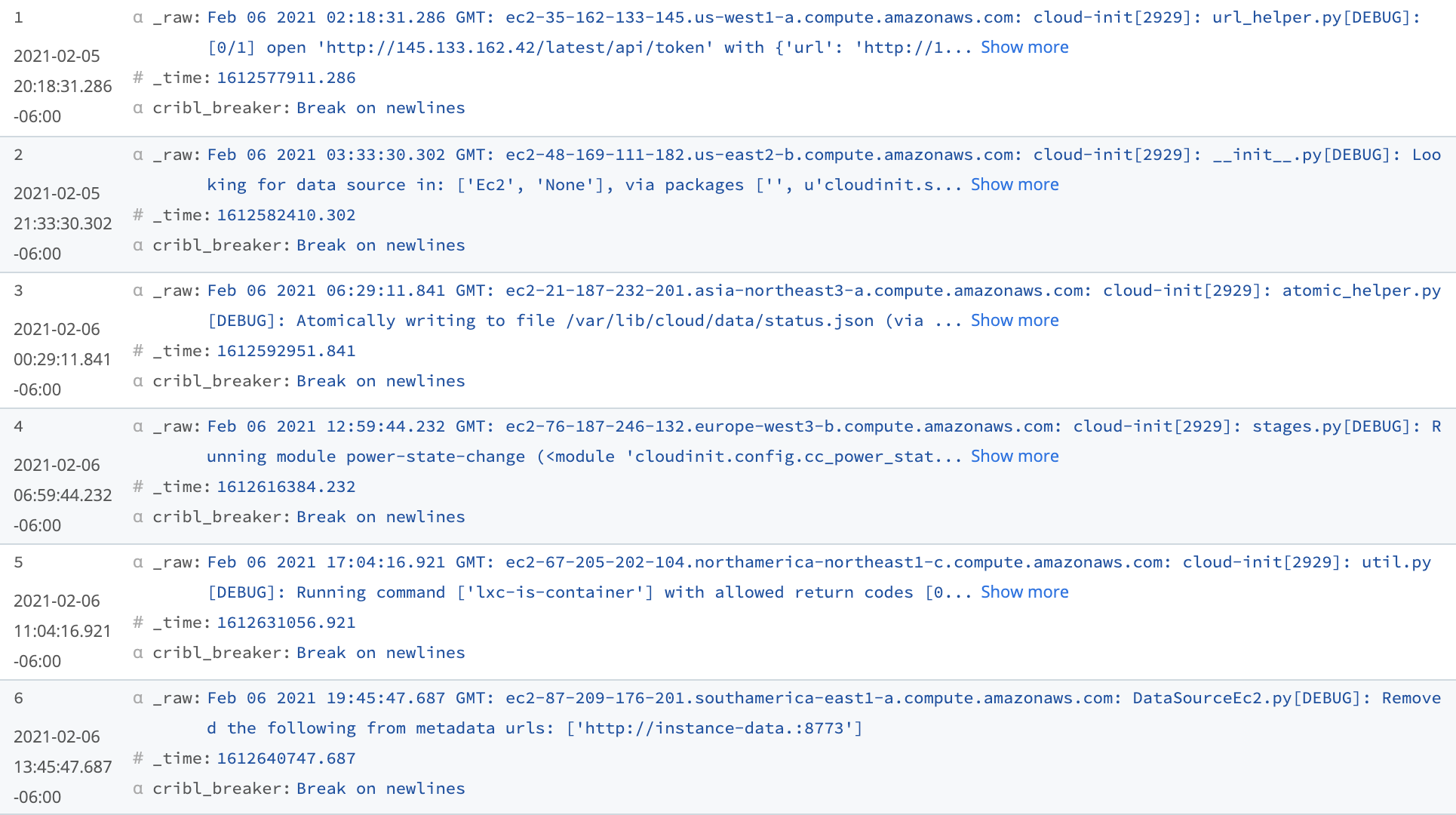
The Regex Extract Function
Before we can assign an index or sourcetype, we need to extract the host, region, az, and domain fields from the events. We can use a Regex Extract Function with this regular expression to extract all four fields:
GMT:\s+(?<host>[^.]+)\.(?<region>\w+-\w+\d+)-(?<az>[^.]+)\.(?<domain>[^:]+):
Here’s that Regex Extract in a Cribl Stream Pipeline:
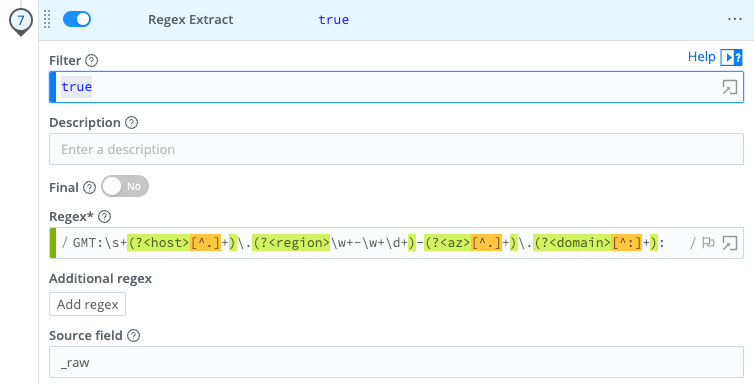
Results of the Regex Extract Function
On the OUT tab of Cribl Stream’s Preview pane, the extracted fields of az, domain, host, and region now appear below the _raw event. You can use these extracted fields for searching in your preferred search solution.
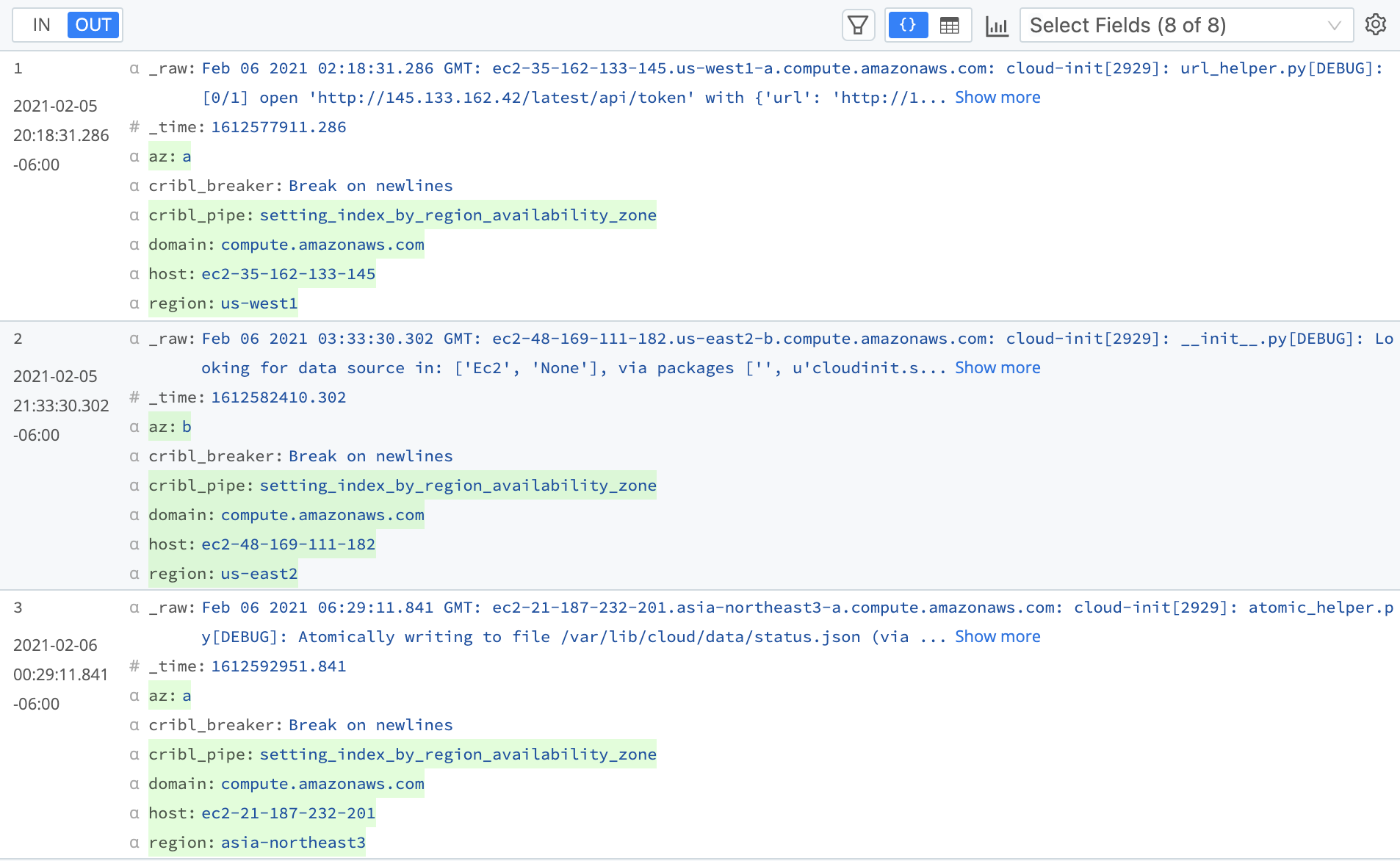
Lookups
We still need to determine the index and sourcetype. Cribl Stream’s Lookup Function enriches events with external fields. We’ll use it with the newly extracted region field to assign an index and sourcetype to these events.
Lookup File
First, we need to create a lookup table for the Function to reference. For this, we’ll use regex again.
In the table below, five simple regular expressions map the extracted region field to the appropriate index and sourcetype. For example, the region us-west1-a starts with us, so it matches the first regular expression: us.+
We use this lookup table’s first row to assign an index of usa_index_tier, and a sourcetype of cloud-init, to each matching event. The region patterns in the table’s four remaining rows work the same way.

Lookup Function
With the lookup table saved as region_index_sourcetype.csv, the Lookup Function below matches the events’ extracted region field against the regular expressions, and returns the matching index and sourcetype.
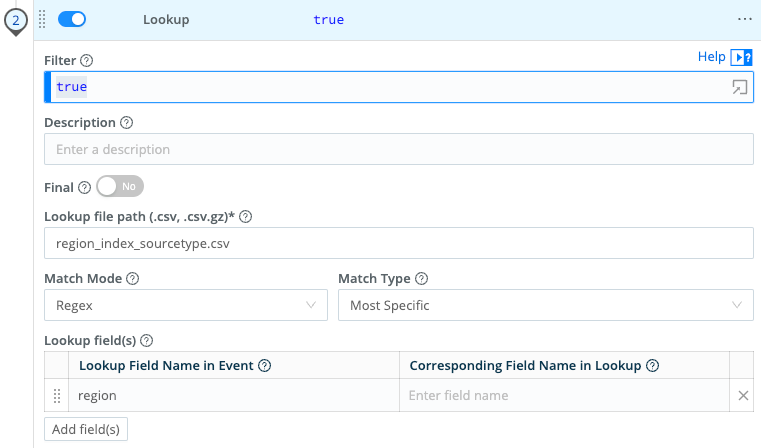
There’s actually more here than meets the eye. Note that we’ve specified no Output Fields. From the Lookup Function’s documentation, we know this means that the Function will default to outputting all fields in the lookup table. So we get the contents of both remaining columns in the table we saw above: index and sourcetype.
Results of the Lookup Function
With the Lookup Function added to our Pipeline, the Preview pane’s OUT tab shows that the index and sourcetype are now added to each event.
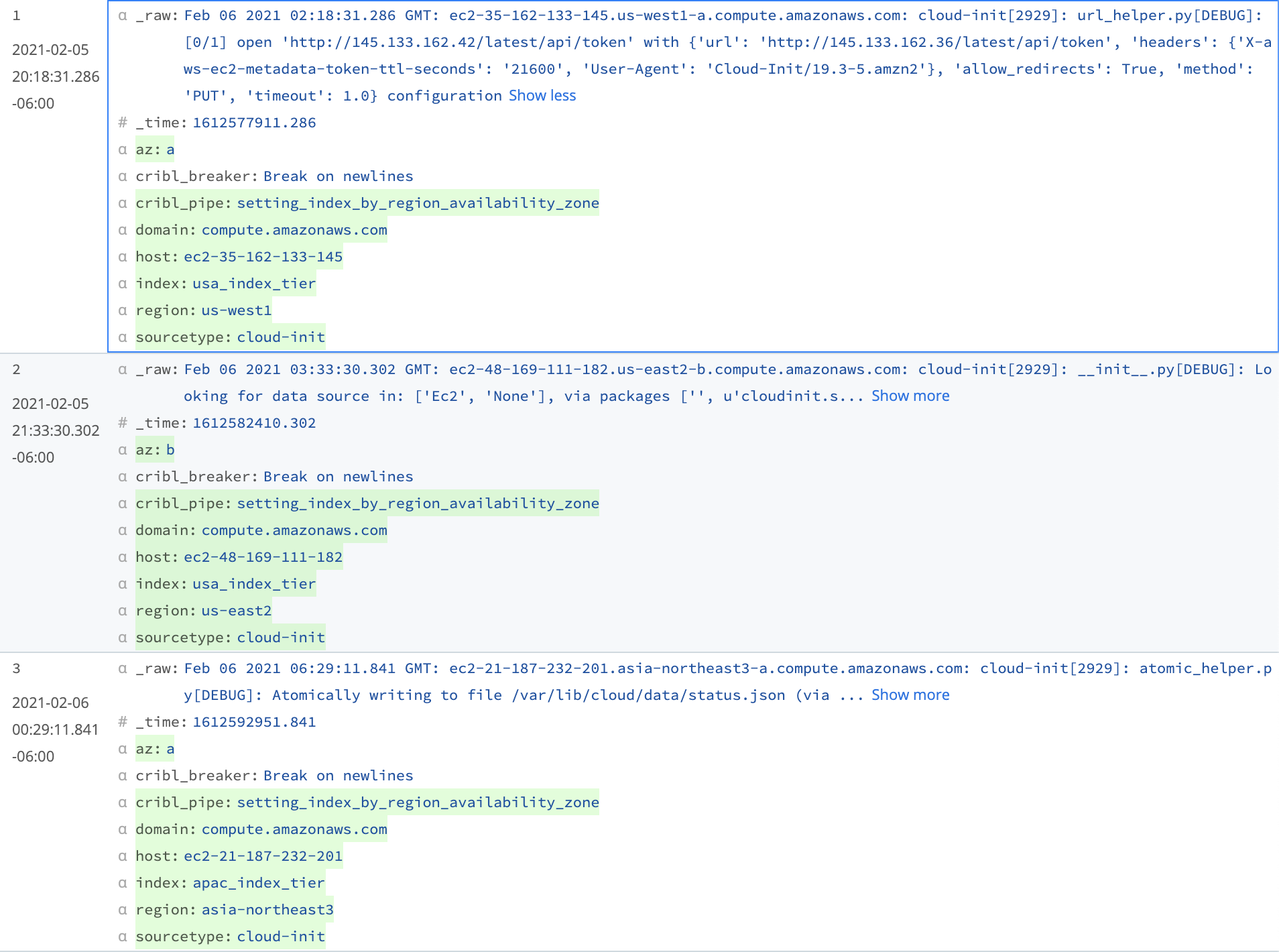
Getting Host IP Address from Host Name
Since the IP address is present in the host field, we can create the host_ip field using an Eval Function with this replace method:
host.replace(/\w+-(\d+)-(\d+)-(\d+)-(\d+)/,'$1.$2.$3.$4')
This regular expression uses capture groups and pulls the four IP octets present in the hostname to build the host_ip. These four capture groups are noted as $1.$2.$3.$4, respectively. This method is very fast, and removes the need to perform a DNS lookup from the host field to get the host’s IP address. Magic!
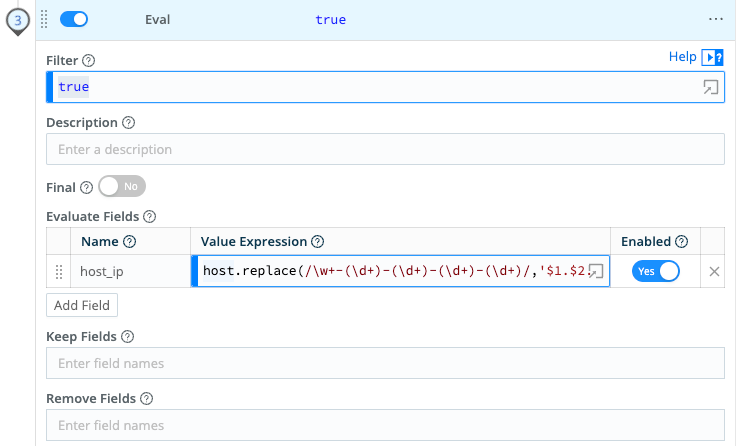
Results of the Eval Function and Replace Method
The host_ip field is now added to the events, displayed below host:
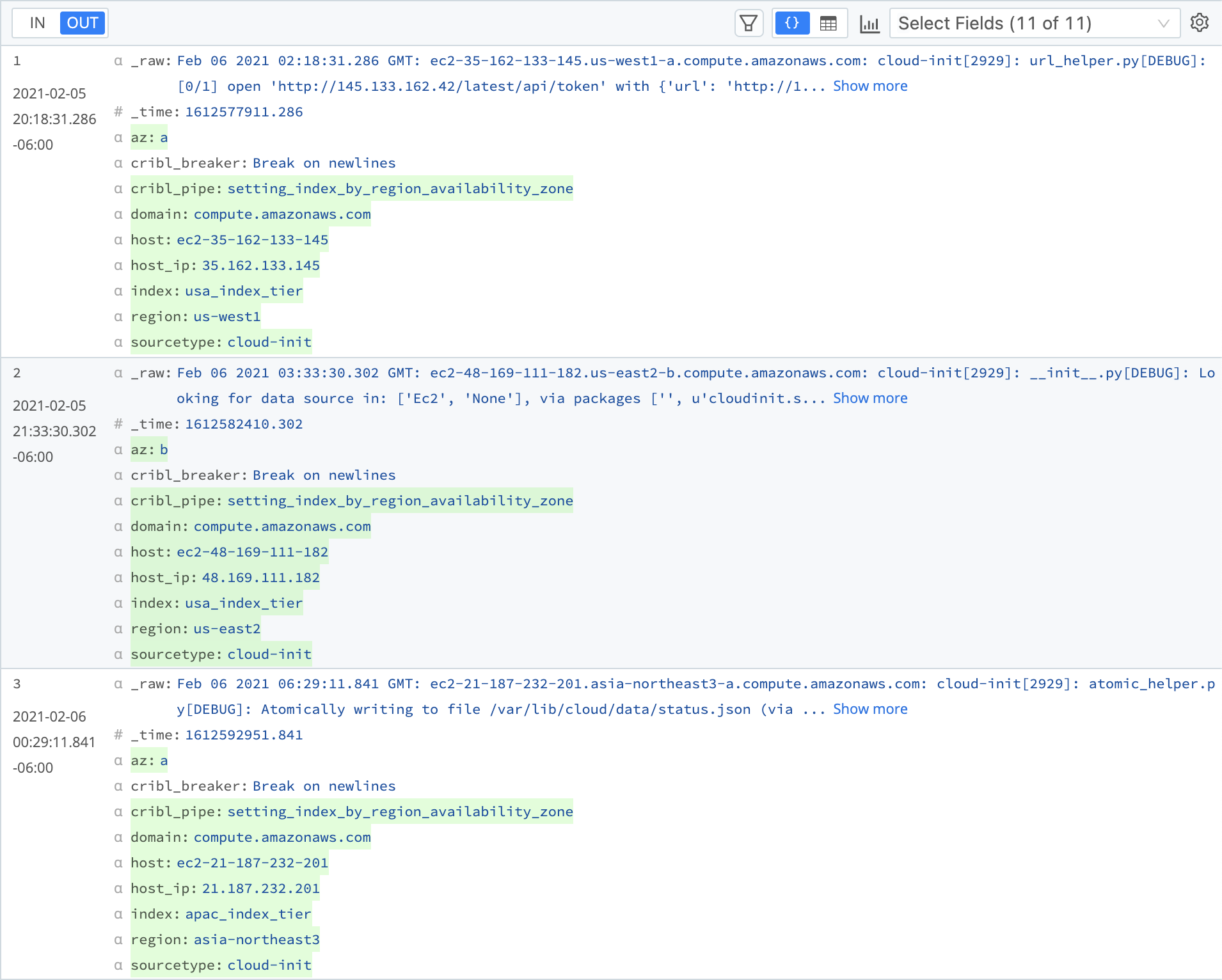
Customizing the Sourcetype
Finally, let’s put some sense into the sourcetype field, using another Eval Function. By combining the values of the ${sourcetype}_${region}_${az}, the sourcetype becomes cloud-init_us-west1_a - so now you can understand much more about the sourcetype at a glance.
Examine this Eval Function’s value expression, taking careful note of the backticks (` `) and braces ({ }) that surround the field names, and the underscore (_) that separates them.
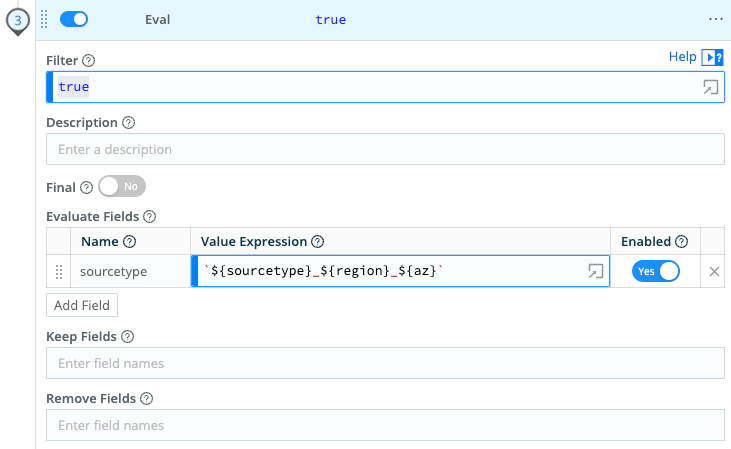
Results of the Eval Function to Combine Values
Take a look at the updated sourcetypes, and enjoy exploring Cribl Stream with your new knowledge!
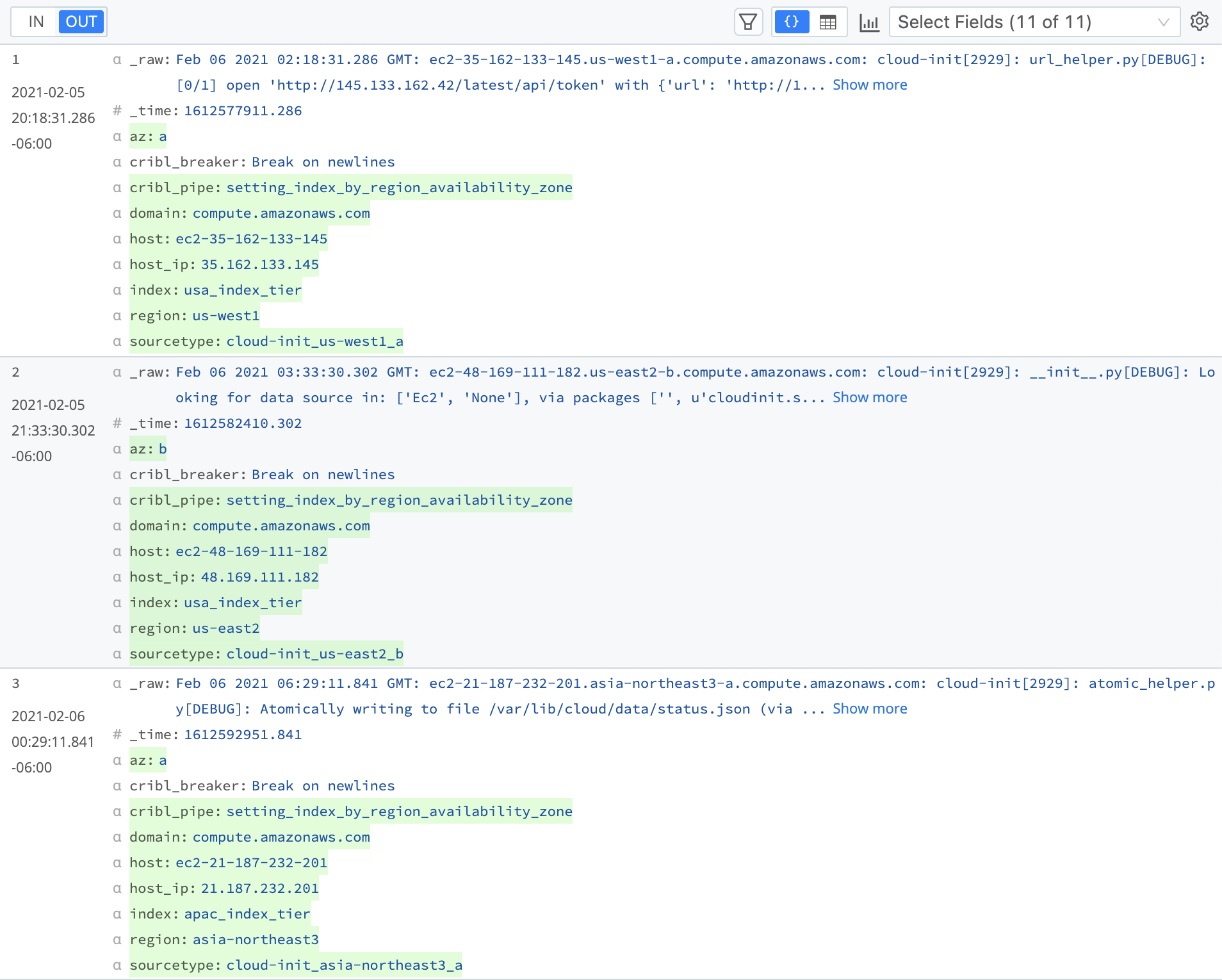
Try This at Home
Below you’ll find the lookup table, Pipeline, and sample events demonstrated in this use case. Create the lookup file first, and then import the Pipeline. (The order matters, because the Pipeline import depends on the lookup table’s presence.)
Lookup Table
To create the lookup table in Cribl Stream’s UI, select Knowledge > Lookups, then click New Lookup File and select Create with Text Editor.
Copy and paste in the header and rows listed below, then save the result as: region_index_sourcetype.csv.
region,index,sourcetype
us.+,usa_index_tier,cloud-init
asia.+,apac_index_tier,cloud-init
europe.+,emea_index_tier,cloud-init
northamerica.+,na_index_tier,cloud-init
southamerica.+,ltam_index_tier,cloud-initPipeline
Below is an export of the whole Cribl Stream Pipeline presented here. Import this JSON to get a Pipeline named: setting_index_by_region_availability_zone.json.
{
"id": "setting_index_by_region_availability_zone",
"conf": {
"output": "default",
"groups": {},
"asyncFuncTimeout": 1000,
"functions": [
{
"filter": "true",
"conf": {
"comment": "This pipeline demonstrates four different ways to leverage regular expressions in a Cribl Stream Pipeline including field extraction, lookup, replace, and field value manipulation."
},
"id": "comment"
},
{
"filter": "true",
"conf": {
"source": "_raw",
"iterations": 100,
"overwrite": false,
"regex": "/GMT:\\s+(?<host>[^.]+)\\.(?<region>\\w+-\\w+\\d+)-(?<az>[^.]+)\\.(?<domain>[^:]+):/"
},
"id": "regex_extract",
"disabled": false,
"description": "Extract host, region, availability_zone, and domain"
},
{
"filter": "true",
"conf": {
"matchMode": "regex",
"matchType": "specific",
"reloadPeriodSec": 60,
"addToEvent": false,
"inFields": [
{
"eventField": "region"
}
],
"ignoreCase": false,
"file": "region_index_sourcetype.csv"
},
"id": "lookup",
"disabled": false,
"description": "Lookup index and sourcetype using regex matching"
},
{
"filter": "true",
"conf": {
"add": [
{
"name": "host_ip",
"value": "host.replace(/\\w+-(\\d+)-(\\d+)-(\\d+)-(\\d+)/,'$1.$2.$3.$4')"
}
]
},
"id": "eval",
"description": "Create IP from hostname, removing DNS requirement",
"disabled": false
},
{
"filter": "true",
"conf": {
"add": [
{
"name": "sourcetype",
"value": "`${sourcetype}_${region}_${az}`"
}
]
},
"id": "eval",
"description": "Append region and az to sourcetype",
"disabled": false
}
]
}
}Sample Events
And here’s a sample of raw events that you can upload or copy/paste into Cribl Stream’s Preview pane to test the Pipeline’s Functions:
Feb 06 2021 02:18:31.286 GMT: ec2-35-162-133-145.us-west1-a.compute.amazonaws.com: cloud-init[2929]: url_helper.py[DEBUG]: [0/1] open 'http://145.133.162.42/latest/api/token' with {'url': 'http://145.133.162.36/latest/api/token', 'headers': {'X-aws-ec2-metadata-token-ttl-seconds': '21600', 'User-Agent': 'Cloud-Init/19.3-5.amzn2'}, 'allow_redirects': True, 'method': 'PUT', 'timeout': 1.0} configuration
Feb 06 2021 03:33:30.302 GMT: ec2-48-169-111-182.us-east2-b.compute.amazonaws.com: cloud-init[2929]: __init__.py[DEBUG]: Looking for data source in: ['Ec2', 'None'], via packages ['', u'cloudinit.sources'] that matches dependencies ['FILESYSTEM']
Feb 06 2021 06:29:11.841 GMT: ec2-21-187-232-201.asia-northeast3-a.compute.amazonaws.com: cloud-init[2929]: atomic_helper.py[DEBUG]: Atomically writing to file /var/lib/cloud/data/status.json (via temporary file /var/lib/cloud/data/tmpS7ibzJ) - w:[644] 489 bytes/chars
Feb 06 2021 12:59:44.232 GMT: ec2-76-187-246-132.europe-west3-b.compute.amazonaws.com: cloud-init[2929]: stages.py[DEBUG]: Running module power-state-change (<module 'cloudinit.config.cc_power_state_change' from '/usr/lib/python2.7/site-packages/cloudinit/config/cc_power_state_change.pyc'>) with frequency once-per-instance
Feb 06 2021 17:04:16.921 GMT: ec2-67-205-202-104.northamerica-northeast1-c.compute.amazonaws.com: cloud-init[2929]: util.py[DEBUG]: Running command ['lxc-is-container'] with allowed return codes [0] (shell=False, capture=True)
Feb 06 2021 19:45:47.687 GMT: ec2-87-209-176-201.southamerica-east1-a.compute.amazonaws.com: DataSourceEc2.py[DEBUG]: Removed the following from metadata urls: ['http://instance-data.:8773']From here, modify the sample data, lookup table, and Functions to adapt this approach to your own needs!





